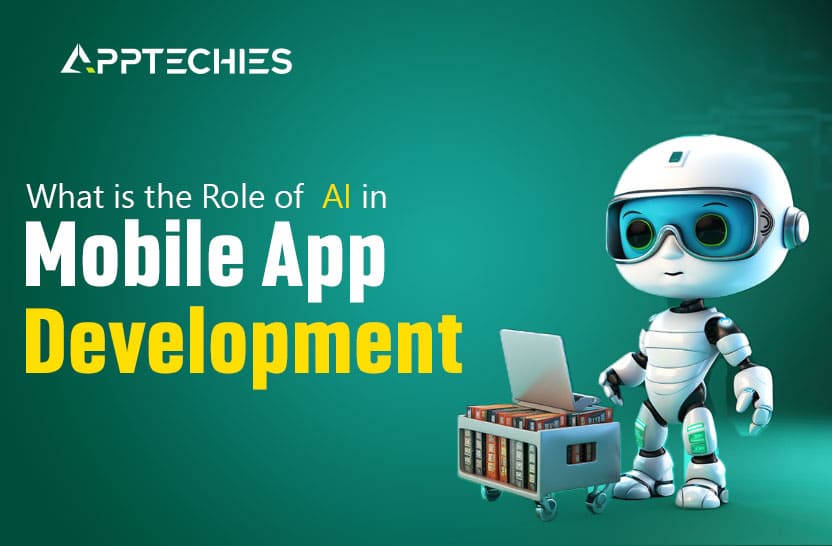
What is the Role of AI in Mobile App Development in 2025
In today’s modern digital world, the power of AI in mobile app development is growing rapidly. Over time, Artificial Intelligence has become the most important part of mobile app development. Have you ever wondered? Whenever you use a mobile app, how do you get what you are looking for? Whether it’s your shopping app or a music app, you get a notification or suggestion of your favorite product that you need. It’s not just magic, it is AI working behind the mobile app evolution, making apps smarter, more intuitive, and highly efficient.
Every business is implementing AI in mobile apps for a better user experience and successful growth. Nowadays, AI is a technology trend that every business needs. Market.US studies indicate that by 2034, the market value of Global AI in Mobile Apps is projected to grow approximately $354.09 Billion. Revenue In 2024 is expected to rise $21.23 Billion with Compound Annual Growth Rate of 32.5% from 2025 to 2034.
Artificial Intelligence is completely changing how we use our mobile devices. From real-time image recognition and voice assistants like Siri to intelligent chatbots like ChatGPT and customized recommendations. Businesses are integrating AI in the mobile app development process to fulfill users’ needs. In this blog, we will discuss the role of AI in mobile app development, its advantages, how to find the right AI-powered mobile app development company and the best AI tools for app development.
What is Artificial Intelligence?
Artificial Intelligence (AI) is the science of making machines smart to carry out activities like humans by learning human intelligence. AI is the combination of computer science, deep learning, machine learning and natural language processing (NLP), computer vision, robotics, and neural networks. It allows apps or computers to analyze data, identify patterns and adapt user behavior. Instead of following a pre-set of rules. That means, like human machines are capable of making decisions and can do multiple tasks more quickly.
Why use AI in App Development?
The demand for Artificial Intelligence is rising in the digital era. Using AI in app development elevates the performance of the app, making it smarter, quicker, and more adaptable. AI improves customer satisfaction by letting apps learn and adapt from user behavior. This is why many companies integrate artificial intelligence in mobile apps to stay ahead in a competitive market.
Additionally, it also helps to reduce manual efforts and improve decisions with future prediction analysis. However, the cost to build an AI mobile app is based on a number of aspects. Increases in customer retention and ROI are noticed by businesses who invest in Artificial Intelligence app development.
Benefits of using AI in Mobile App Development
How the integration of AI in mobile app development has changed how apps work, interact with users and give advantage to companies. Artificial Intelligence improves the performance, purpose and intelligence of mobile apps in different industries. Below are the major benefits of using AI in the development of mobile apps:
Personalized User Experience
AI allows Apps to understand user activity, preferences and use patterns to give customized suggestions. This results in a more attractive user experience, high satisfaction and better engagement. For example, AI-based shopping apps recommend products according to the history of searching and buying behavior.
Intelligent Chatbots and Virtual Assistants
AI chatbots enable real-time customer help without human interference. These bots can understand and respond, handle complaints and help with tasks. This improves communication and reduces operating costs. Voice assistants such as Google Assistant and Siri are examples of AI in app development.
Predictive Analytics
The AI system can analyze user data history to predict future activities. This helps businesses make informed decisions, such as the priority of providing or personalized information. Predictive analysis also improves marketing efforts and meets users’ needs.
Enhanced Search Capabilities
Artificial Intelligence improves app’s search tasks’ accuracy and productivity. Through functions such as voice search, processing of natural language, and auto-complete. It makes it easier for AI users to find out quickly and accurately what they exactly need.
Improved App Security
AI contributes a major role in mobile apps safety by identifying suspicious activities and potential real time threats. This can monitor the user activity to identify and prevent fraud. Biometric authentication systems, such as face identification and fingerprint scanning, are operated by AI algorithms.
Automation of Routine Tasks
AI makes it possible to automate timing and repetitive processes such as customer service, generating content, and data collection. This allows businesses to increase operating efficiency and manage resources more efficiently, and maintain accuracy and stability.
Cost Efficiency and Better ROI
While the AI app development costs may be higher in the beginning, the return is often higher in the long term. AI-driven apps reduce the requirement for manual processes, improve customer interaction. This also streamlines operations, which can increase revenue and lead to low maintenance costs.
Real-Time Language Translation
AI-based translation tools enable apps to support many languages by translating real-time materials. This helps companies reach a global audience and meet users with different linguistic backgrounds without the need for other versions of the app.
Deeper User Insight
AI can process and understand large datasets to detecting trends and preferences in user activity. This insight helps companies to better adjust the app features, content, and marketing strategies to the user’s needs and expectations.
Competitive Advantage
Integrating artificial intelligence in mobile apps lets companies separate themselves from their competitors. Apps with AI-powered features are smarter and easier to use. It helps to improve brand image and user satisfaction. In a crowded app marketplace, this makes you stand out from others.
Latest AI Trends in Mobile App Development
Hyper-Personalization
AI in mobile apps allows the distribution of highly personalized experiences by analyzing user data. Unlike simple customization, personalized uses machine learning to estimate what users need. AI examines large amounts of user data like places, preferences, internet surfing and real-time behavior.
For instance, shopping apps can display products based on recent activity or interest. Streaming platforms can suggest things that fit the user’s taste. This accuracy level improves the user interest, engagement and general satisfaction.
AI-Powered Chatbots & Voice Assistants
AI chatbots and voice assistants change how users interact with the mobile app. These tools can now understand complex language inputs, respond with relevant and real-time solutions 24/7. Without the involvement for human interaction.
Integrated with smartphones, such as voice assistants, is now common in finance and e-commerce apps. By using simple voice commands, they manage tasks like navigation, scheduling or customer service.
AI for security and fraud detection
Safety is one of the most important areas where AI has a major impact. With increasing cyberthreats and data breaches. AI in app development helps to identify suspicious behavior, prevent fraud, and secure data through real-time monitoring.
AI algorithms analyze patterns, identify deviations, and trigger security protocols immediately. Artificial Intelligence is faster than humans in identifying any type of threat. Mobile banking, payment portals and health platforms are implementing AI-based biometric authentication, facial recognition and behavioral insights for strong security.
Super apps and AI in AR/VR
Super apps are all-in-one platforms that offer multiple services under a single interface, such as messages, payment, shopping, and ordering. AI plays an important role in managing these services by activating smart navigation, relevant recommendations and personalizing cross-functional.
AI-powered Augmented Reality (AR) and Virtual Reality (VR) apps provide interactive, intelligent, and user experiences. AI makes AR/VR apps smarter and more attentive by AI-object detection, scene understanding, and tracking of movement in games, virtual shopping, education, and real estate.
Real Examples of AI in Mobile Apps
ChatGPT (by OpenAI)
ChatGPT is one of the most well-known app in recent times. By using advanced natural language treatment (NLP) to engage users in human conversations. Whether users are looking for general information or need coding help, ChatGPT responds accordingly. With over the time learning from user guidelines and modifying the results.
Using NLP and Machine learning to handle complex questions. Adaptive learning of user behavior. This indicates how artificial intelligence app development can create a versatile assistant for both personal and business use.
Snapchat
Snapchat continues to innovate by integrating AI and AR (improved reality) into their mobile experience. From real-time identification of faces to interactive Augmented Reality filters. AI is used by the Snapchat app that captures facial features, detects gestures and smoothly uses animated effects.
Real-time object and face identification. AR Lens using machine learning for customization. Recommend relevant filters. Featuring Artificial Intelligence in app development and AR/VR for compelling and real-time experiences.
Google Lens
Google Lens lets users find the real world through their camera. Whether it is identifying plants, translating the text in real time or scanning the QR code. Google Lens uses Artificial Intelligence to scan images, identify objects and provide immediate action-rich insights by using Artificial Intelligence.
Computer Vision and Image recognition. Using NLP for real-time translation. Visual search based on reference and environment. Integrating several AI fields such as a scale, vision, language and search in artificial intelligence.
Replika
An AI chatbot called Replika is designed for mental health and companionship. It uses deep learning and context AI to offer emotional support, personal reflection and human interactions. Is it unique that the user has their ability to learn and develop based on user interaction and modify responses. It becomes more sympathetic and attractive.
Emotional intelligence imitation. Individual conversation. Continuous learning according to users tone and emotions. A great example of Artificial Intelligence in the development of mobile apps focusing on mental health.
Amazon Shopping App
AI plays a major role in the Amazon app, especially in its product recommendation engine. To suggest products that match the user’s interest by analyzing the user’s history, buying patterns, location and search results. Even before the user searches for them.
Using analytics to predict recommendations. User categorization and behavior modeling. Optimization of stocks and price adjustments. A powerful use of AI in Mobile app development in e-commerce increases the customer experience and drives sales.
Cost of AI in App Development
The cost of AI mobile app development might be between $10,000 and $150,000. App development costs include the complexity of the app and the type of artificial intelligence elements you plan to include.
For example, a basic app that uses AI for features such as chatbots or product recommendations can cost between $10,000 and $25,000. Mid-level apps that include voice recognition, Natural Language Processing (NLP) or image analysis, usually in the $25,000 to $60,000 range. On the other hand, high level AI apps like real-time data analysis, face identification or integration with AR/VR can be more than $100,000 or more.
Many factors affect the AI app development costs, including the depth of AI integration. Whether you use pre-informed models or the customized machine learning algorithms, and the platforms you are targeted (iOS, Android or both). Other additional factors to consider are Backend infrastructure, data size and whether your app needs to work in real time. Design complexity, user experience and development team or expertise also plays a major role. To manage costs, many companies start with MVP using the existing AI API before scaling for more advanced abilities.
How to Calculate App Development Cost?
Here is the formula to calculate the mobile app development cost is given below;
Time required to develop an App * Developer’s per hour charge = Total App Development Cost
Conclusion
AI in apps is no longer a choice for businesses, it becomes a need. As the user’s expectations increase, AI in mobile app development ensures that your app is intelligent, relevant and future-ready.
Whether you are a startup founder or a growing business, artificial intelligence app development is one of the most smart decisions you can make. And with the right partner, like Apptechies, you can create AI-driven Android or iOS App that impress your customers. It also gives you an advantage in the digital market. So what are you waiting for? The future of apps is here, and it is powered by AI.
Frequently Asked Questions
Q. What is Meant by AI in Mobile App Development?
Ans: The Artificial Intelligence in mobile app development to integrate technology such as AI, machine learning, NLP and computer Vision in apps to enable smart features such as privatization, automation and intelligent decisions-making.
Q. What is the future of AI in mobile application development?
Ans: The future of AI in mobile apps, prioritize super-personalization, conversational AI, real-time automation, emotion detection and AI-in AR/VR. This will drive futuristic apps that learn, adapt and develop with user behavior.
Q. What challenges come in adding AI in mobile apps?
Ans: Common challenges are, high AI app development cost is high, privacy problems, integration complexity, quality datasets and real-time performance without eliminating mobile resources.
Q. What is the role of artificial intelligence in modern app development?
Ans: AI plays an important role in enabling intelligent user interaction, automating regular tasks, analyzing user data for insight, increasing security and providing real-time, personal experience.







